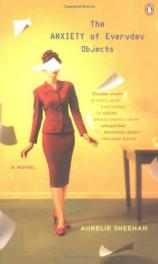Reading Group Guide
Discussion Questions
The Anxiety of Everyday Objects

1. On page 75, Winona calls herself a "girl" as opposed to a woman. Would you agree with Winona's definition of "girl"? What is your definition? Do you think the same distinctions that separate women from girls apply to men and boys?
2. On page 68, Winona says, "The question is . . . who you are when and with whom. . . . So in a sense everyone 'meets' me, but in another way I am constantly shifting around as I meet them." What factors change the manner in which we portray ourselves to the world? Is there such a thing as a true self, a pure self-image, or are self-images always reflections of who we are with? Do you think the same holds for men as well as women?
3. Winona asks herself, "if she was herself only at lunch, who was she the rest of the time? Was she someone else? Were those, the majority of the hours, nothing, or were they the truth? Was she, in fact, a secretary above all else?" Is a person defined by their work, since a majority of their useful hours are spent at work? Is that prospect a scary one or a reassuring one? If a person is not defined by their job, what elements define who they are?
4. On page 172, a lasciviously dressed Winona says she feels like an "anti-feminist." What do you think she means by that? Is her character regularly a feminist? Why or why not?
5. Is Winona any more or less of an artist than Sylvester? How do you define an artist? Is creativity just as important as the act of creation?
6. Why does Winona become so attached to Sandy Spires? Why do you think Sandy allows herself moments of candor and honesty with Winona? What do the two women have in common? How are they different?
7. Why do you think Winona resists a relationship with Rex? She submits to the relationship only after he is no longer a "suit." Why does she seem threatened by the fact that he is a lawyer and not an artist?
8. Winona spends much of her time both reviling and reveling in her job as a secretary. The word "secretary" conjures images of submissive women, both matrons and vixens, striving to anticipate the needs of their male bosses. How does the portrait of Winona fit into your image of what it means to be a secretary? Do you think such subservient social roles are still relegated to women today?
9. Voyeurism plays a large role in the plot of Anxiety. Nancy watches Rex and Winona, Winona secretly videotapes Sandy, and blind Sandy is a spy for the enemy, gathering evidence against her own employer. What is the significance of these stealth operations? Is their invisibility a weakness or a source of power?
The Anxiety of Everyday Objects
- Publication Date: February 24, 2004
- Mass Market Paperback: 288 pages
- Publisher: Penguin (Non-Classics)
- ISBN-10: 0142003700
- ISBN-13: 9780142003701






